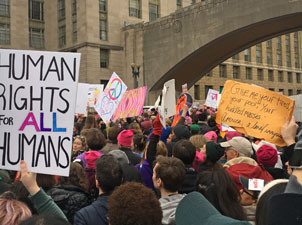
Is Your Feminism Intersectional?
Catherine G.
March 30, 2017
I am a Black woman. Despite the marriage of these two identities, my Blackness tends to always feel divorced from the latter. Separate and not equal. Not equal because while there are shared struggles specific to the woman experience, not all women are valued or discriminated against equally and liberation for black and brown women is merely an afterthought, if even thought of at all. Separate because being Black in America affords me with a set of unique experiences that can only be comprehended by people who share that identity with me. And, it is precisely this distinction that creates a tension between my two identities.
In our history, the majority of women showed up almost exclusively for white women’s causes. Not all women could vote in 1920 after the 19th Amendment was passed, yet that year is taught in high school history courses. Enraged protests against the $0.77 women earn to every $1.00 a white male makes ignore the fact that for a Black woman it’s $0.60. Thousands of women rushed to Susan B. Anthony’s grave after the 2016 Election with their “I voted” stickers. While Susan B. Anthony fought tirelessly for women’s right to vote neither my personhood, nor the personhood of my ancestors were included in her fight. Anthony once said, “I will cut off this right arm of mine before I will ever work or demand the ballot for the Negro and not the woman.” And still we, as Black women, are expected to learn the history of Susan B. Anthony before Ida B. Wells or Sojourner Truth.
For me, intersectionality means acknowledging that there are varying components that shape our womanhood. I do not support any kind of feminism that functions on the institution of Whiteness or unearned privilege. Instead, I support feminism that is intersectional at every level. This Women’s History Month, I vowed to listen and seek out women’s voices that are not always brought to the forefront or celebrated. Women like Kimberlé Williams Crenshaw, Malala Yousafzai, and Janet Mock who have devoted their lives to effecting change for all. I vow to continue this effort and hope that all proclaimed feminists will follow suit. Because as Audre Lorde pointed out, “It is not our differences that divide us. It is our inability to recognize, accept, and celebrate those differences.”







